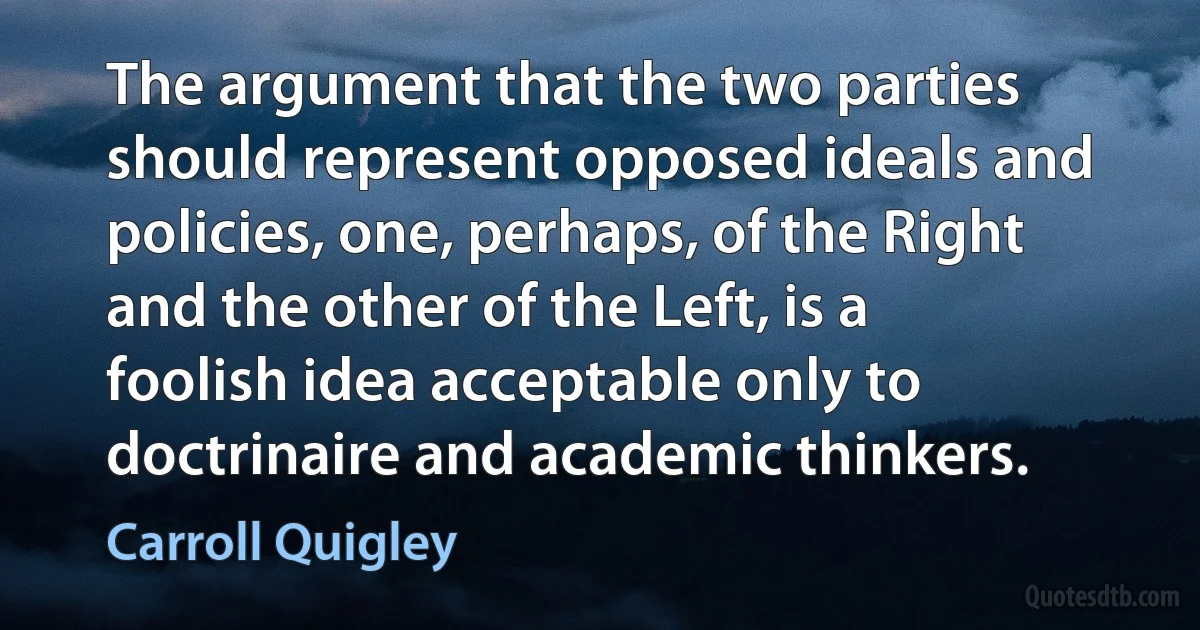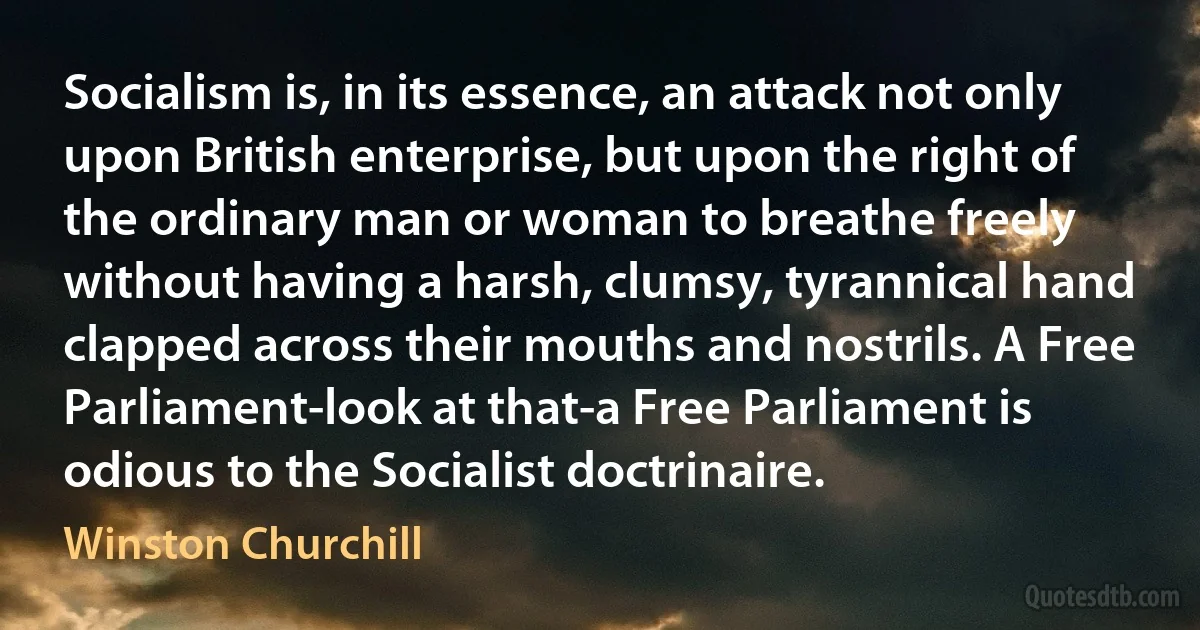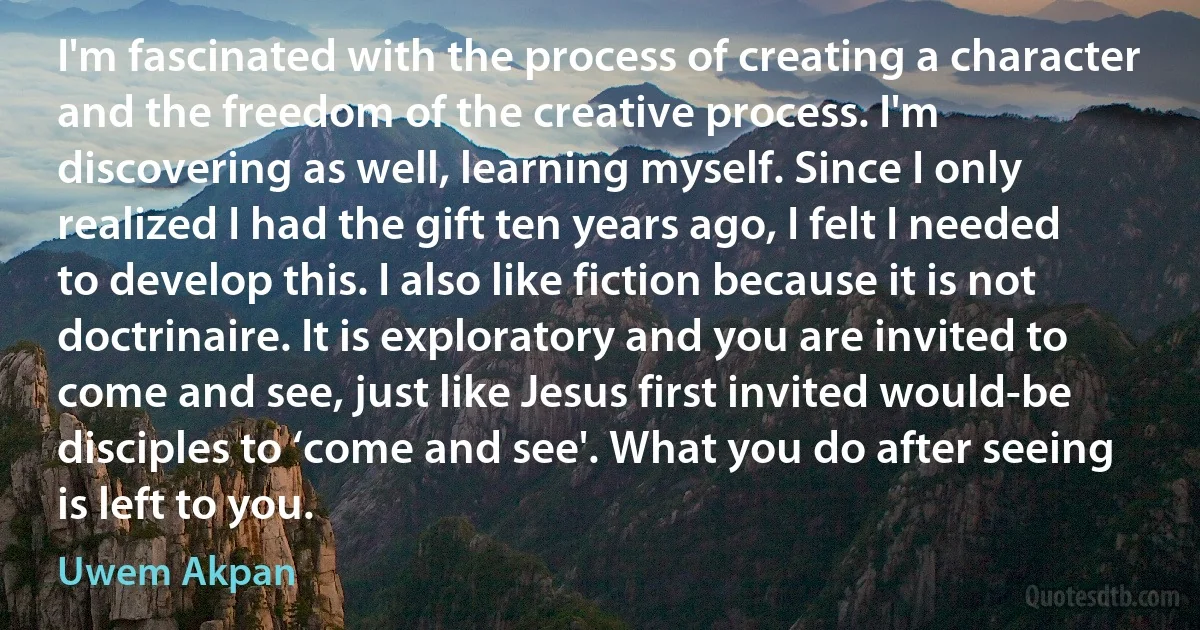Doctrinaire Quotes
Liberalism is the philosophy for our time, because it does not try to conserve every tradition of the past, because it does not apply to new problems the old doctrinaire solutions, because it is prepared to experiment and innovate and because it knows that the past is less important than the future.

Pierre Trudeau
What is this principle? It is not embodied in some narrow doctrinaire formula, as some of our opponents would suggest. Still less is it a particular economic or political formula laid down once for all. It is essentially a moral principle on which we believe the life of nations and of individuals should be ordered. That principle is the brotherhood of man.

Clement Attlee
We can imagine that the Academy, which could be attended only by men of leisure, was a cradle of discontent. The author of the Laws was a disgruntled old man, full of political rancor, fearing and hating the crowd and above all their demagogues; his prejudices had crystallized and he had become an old doctrinaire, unable to see anything but the reflections of his own personality and to hear anything but the echoes of his own thoughts. The worst of it was that he, a noble Athenian, admired the very Spartans who had defeated and humiliated his fatherland. Plato was witnessing a social revolution (even as we are) and he could not bear it at all. His main concern was: how could one stop it.

George Sarton
... Marx and Bakunin were engaged in a conflict in which it is hard to distinguish political from personal animosities. Marx did his best to persuade everybody that Bakunin was only using the International for his private ends, and in March 1870 he circulated a confidential letter to this effect. He also saw the hand of Bakunin (whom he never met after 1864) on every occasion when his own policies were opposed in the International. Bakunin, for his part, not only combated Marx's political programme but, as he often wrote, regarded Marx as a disloyal, revengeful man, obsessed with power and determined to impose his own despotic authority on the whole revolutionary movement. Marx, he said, had all the merits and defects of the Jewish character; he was highly intelligent and deeply read, but an inveterate doctrinaire and fantastically vain, an intriguer and morbidly envious of all who, like Lassalle, had cut a more important figure than himself in public life. (pp. 247-8)

Leszek Kołakowski
Dialogue is much more than the communication of a truth. It arises from the enjoyment of speaking and it enriches those who express their love for one another through the medium of words. This is an enrichment which does not consist in objects but in persons who share themselves in dialogue. A preaching which would be purely moralistic or doctrinaire, or one which turns into a lecture on biblical exegesis, detracts from this heart-to-heart communication which takes place in the homily and possesses a quasi-sacramental character: "Faith comes from what is heard, and what is heard comes by the preaching of Christ”.

Pope Francis
Since no example of Leninist socialism is other than totalitarian and bureaucratic, one wonders how the doctrinaire ideologists can dismiss so disdainfully those who point out that the promise of socialism in freedom, while surely praiseworthy, remains a promise only, not something experienced in reality. The utopia of socialism with a human face has been crushed everywhere even before it could be born. How distressing that becoming humane, which should be the least we could expect from a regime dedicated to liberating humanity, should present for socialism a problem as impossible as squaring the circle.

Jean-François Revel
Christianity in our country is a lot like what the Ducksters profess. No longer doctrinaire or demanding, the mishmash of pop-religion practiced in churches across America is an extension of the therapeutic culture: festooned with feelings, mostly misdirected. Untempered by intelligent interpretation of scripture... American pop-theology: light on doctrine, heavy on hellfire and damnation.

Ilana Mercer
When [Nazi] power had been attained there was not only no unity in regard to future policy but no united group of leaders. The party included a sort of sample collection of all political outlooks in Germany, from crass reactionaries to doctrinaire pacifists and the extremist Left-wing Socialists.

Hermann Rauschning
The worst reproach that Engels could make against the first English Marxists was that they were applying Marxism in a sectarian spirit. What would he have said, had he lived to see it, about a school of Marxists who after succeeding in capturing the state power proceeded to make a state religion of Marxism, a religion whose articles of faith and their interpretation are watched over by the government, a religion, the criticism of which, nay, the slightest deviation from which, is sternly punished by the State; a Marxism ruling by the methods of the Spanish Inquisition, propagated with fire and sword, practicing a theatrical ritual, as illustrated by the embalmed body of Lenin: a Marxism reduced to the status not only of a state religion but of a medieval or oriental faith? Such a Marxism may indeed be called a doctrinaire fanaticism.

Karl Kautsky
Silly doctrinaire theories which regard the state as a parasitic excrescence on society cannot explain its centuries-long persistence, its ongoing encroachment upon what was previously market terrain, or its acceptance by the overwhelming majority of people including its demonstrable victims.

Bob Black
In the usual (though certainly not in every) public decision on economic policy, the choice is between courses that are almost equally good or equally bad. It is the narrowest decisions that are most ardently debated. If the world is lucky enough to enjoy peace, it may even one day make the discovery, to the horror of doctrinaire free-enterprisers and doctrinaire planners alike, that what is called capitalism and what is called socialism are both capable of working quite well.

John Kenneth Galbraith
I am able to approach the Buddhas barefoot and undisturbed, my feet in wet grass, wet sand. Then the silence of the extraordinary faces. The great smiles. Huge and yet subtle. Filled with every possibility, questioning nothing, knowing everything, rejecting nothing, the peace not of emotional resignation but of Madhyamika, of sunyata, that has seen through every question without trying to discredit anyone or anything - without refutation - without establishing some other argument. For the doctrinaire, the mind that needs well-established positions, such peace, such silence, can be frightening.

Thomas Merton



